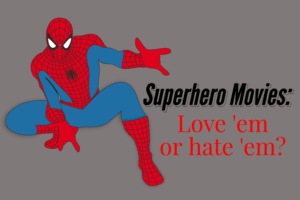Superhero movies are overrated
February 18, 2022
What if I told you the new Spider-Man movie was overrated? From my experience, you would probably try to throat punch me. I am confident that there is no quicker way to personally offend your average freshman boy than to tell him that you didn’t like the newest Marvel movie. And it’s not just freshmen or dudes; everyone seems to be a die-hard superhero fan. The adoration of these movies is so bizarre to me because, as far as film genres go, superhero movies tend to be sub-par.
The main issue with these films is the lack of boundaries. Unlike regular action films, the protagonist in superhero movies can withstand normally fatal physical blows and perform crazy feats of strength. This would be cool and all if there was an understood limit to their powers, but the problem is that there isn’t. Spider-Man survives being hit by a train. Black Panther takes falls of hundreds of feet and gets up like it’s nothing. Captain America crashes an aircraft into the Arctic, is frozen for 70 years, and then wakes up fine. When a hero can survive things like these, it really cheapens the action scenes. So our hero is getting punched and thrown around, what does it matter? He’s already been hit by a train; he’s going to be okay. In the end, if a hero does get seriously injured, it’s from an arbitrary event. The Tobey Maguire Spider-Man gets stabbed in both Spider-Man 3 and No Way Home, but is only really affected by it in the later movie. The degree to which a hero is injured depends on its value to the plot. It’s unrealistic.
Speaking of unrealistic, the addition of the Multiverse in these latest superhero movies has made these films even more ridiculous than ever. It must be nice to be a Marvel screenwriter. Need a villain? Easy, they’ll just appear from another universe to battle some assortment of heroes from whichever universe is most convenient. With the introduction of this incomprehensible system of universes, writers can make pretty much anything happen without giving a clear reason. The audience just accepts that the workings of the Multiverse are just too complicated to understand. Admittedly, this sounds like a good way to cause interesting situations, but this comes at the cost of coherency, which in turn alienates the audience from the film. There has to be some understood ground rules in a movie. The Multiverse brings to mind the kids that would make a cross with their fingers and play “God” in a game of Rock, Paper, Scissors. It’s convenient, but it really screws up the game.
Lastly, most movies are guilty of predictability, but none are so much so as superhero movies. Granted, the confusion of the Multiverse with all its new superhero interactions has seemed to change this in recent movies, but even this is only a superficial distinction. In almost every movie, the hero is pitted against a sinisterly-intentioned villain, with whom the hero spars a couple times before the final showdown. In the final battle, the hero defeats the villain to defend the common good but sacrifices something personal to them. Captain America saves New York from the crashing bomber plane but gives up a life with Peggy. Spider-Man closes the inter-dimensional portal bringing infinite villains into his universe but is forgotten by everyone. Iron Man saves the world by destroying Thanos but dies as a result. Sure, it’s noble. But it’s also predictable and boring.
Despite these flaws, I know my friends will still go berserk when the next big name Marvel movie comes out. In fact, I’ll probably go see it with them, just to stay current. I know, however, that I will end up aggressively explaining the reasons that the movie is ridiculous, leaving everyone, including myself, wishing that I just went to see a normal action movie instead.













